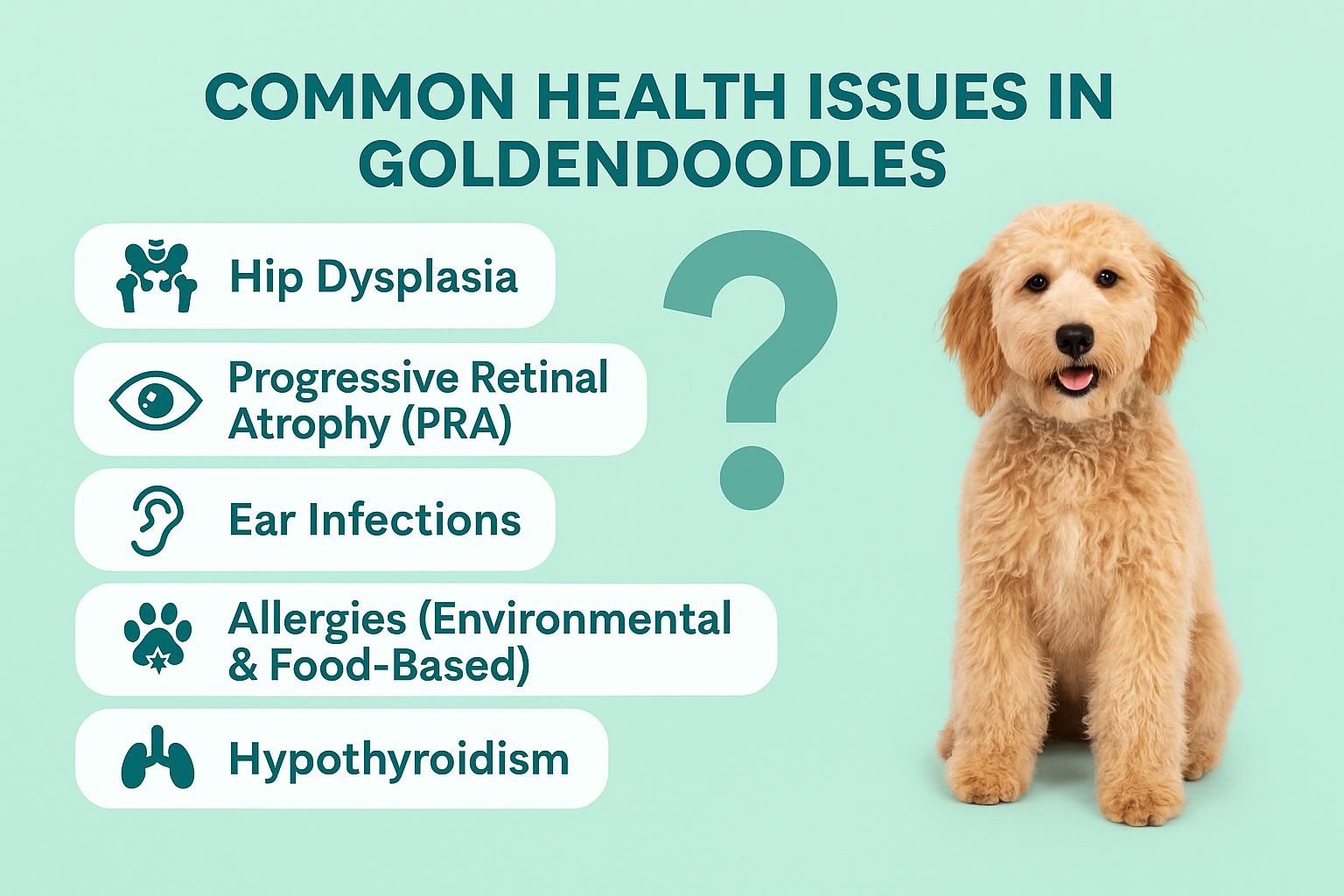Is Your Goldendoodle at Risk? Common Health Concerns & How to Prevent Them
By Mawoo Pets · 5 minutes read
Last updated: June 19th, 2025

Goldendoodles are beloved for their intelligence, affectionate nature, and low-shedding coats—but like any hybrid breed, they have specific health needs that responsible owners should be aware of. This guide breaks down the most common health issues in Goldendoodles and how to prevent them, helping you raise a happy, healthy pup.
Why Goldendoodles Require Special Attention
As a cross between a Golden Retriever and a Poodle, the Goldendoodle can inherit health traits from both parent breeds. While hybrid vigor may reduce the risk of some genetic issues, regular care and early intervention remain essential to their well-being.
Common Health Issues in Goldendoodles
1. Hip Dysplasia
This inherited joint condition occurs when the hip socket doesn’t form properly, leading to pain and mobility issues over time.
Prevention Tips:
Feed a high-quality diet to support joint health
Avoid excessive exercise in puppies
Schedule regular vet exams for early detection
2. Progressive Retinal Atrophy (PRA)
PRA is a group of inherited diseases that cause gradual vision loss and eventual blindness.
Prevention Tips:
Ask your breeder for genetic test results
Watch for signs of night blindness or hesitancy in dim light
Schedule routine eye checks with your vet
3. Ear Infections
Goldendoodles have floppy, hairy ears that trap moisture, making them prone to chronic ear infections.
Prevention Tips:
Clean ears weekly with a vet-approved solution
Dry ears thoroughly after swimming or baths
Monitor for redness, odor, or head shaking
4. Allergies (Environmental & Food-Based)
Many Goldendoodles suffer from skin allergies caused by pollen, dust, or certain foods.
Prevention Tips:
Use gentle, hypoallergenic shampoos
Work with your vet to identify and eliminate allergens
Keep their coat clean and brushed to reduce irritants
5. Hypothyroidism
This hormonal condition can cause weight gain, hair loss, and lethargy if left untreated.
Prevention Tips:
Schedule bloodwork at annual checkups
Monitor for symptoms like fatigue or skin issues
Follow your vet’s treatment plan if diagnosed
Keeping Your Goldendoodle Healthy: Daily Tips From our Breeders
Groom Regularly: Brushing 3–4 times per week reduces matting and helps detect skin issues early.
Exercise Smartly: Goldendoodles need daily activity, but avoid overexertion in young pups with developing joints.
Vet Visits: Annual exams and dental cleanings are essential for long-term health.
Nutrition: Choose food tailored to your dog’s age, weight, and activity level, with joint and skin support where needed.

Why Choose a Reputable Breeder?
A major part of prevention starts before you even bring your puppy home. At Mawoo Pets, we only work with reputable breeders who screen for hereditary conditions and prioritize the long-term health of their litters.
👉 Browse Goldendoodle puppies on Mawoo Pets
Frequently Asked Questions About Goldendoodle Health
1. Are Goldendoodles considered a healthy breed?
Yes, Goldendoodles are generally healthy, but they can inherit health issues from either parent breed, including hip dysplasia, PRA, and allergies.
2. How often should I groom my Goldendoodle?
Brush your Goldendoodle 3–4 times a week and schedule a professional grooming every 6–8 weeks to keep their coat healthy and mat-free.
3. Do Goldendoodles need genetic testing?
If you're getting your puppy from a breeder, yes—ask for DNA health testing for common hereditary conditions like PRA and hip dysplasia.
4. What are signs of allergies in Goldendoodles?
Itching, licking paws, red skin, ear infections, or gastrointestinal upset can all point to allergies.
5. How can I support joint health in my Goldendoodle?
Maintain a healthy weight, offer joint supplements as advised by your vet, and limit jumping or rough play, especially in young dogs.
Final Thoughts
Goldendoodles are joyful, intelligent companions, but like any breed, they come with unique health risks. With the right information and proactive care, you can give your Doodle the healthy life they deserve.
About This Blog
All content on the Mawoo Pets blog is created in-house by our writing team and reviewed by our network of veterinarians and ethical breeders to ensure accuracy and trustworthiness.
Related articles
Related puppies for sale
Any questions? Get in touch!
We are here to support you every step of the way. Our concierge service is here daily to answer your questions!
Chat or speak with our team Mon-Sat 9a-9p ET.





























